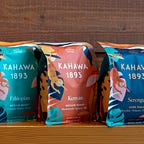Why Kenyan Coffee is the Best in the World
Kenyan coffee is the undisputed favorite among coffee connoisseurs, loved for the complexity of its flavors, unlike any other coffee in the world. My family has grown coffee in Kenya for three generations and not long ago, I began to roast and share the coffee with the world. Often, I get asked why Kenyan coffee tastes so good. Well, there is a lot that goes into producing the perfect cup of coffee and every small step from farm-to-cup matters.
Coffee is a fruit
Like many other fruits, coffee cherries grow on trees. The soil, climate, altitude, and cultivation methods used affect the flavor of the beans. In wine, this is typically referred to as ‘terroir’ and distinguishes French wine from that produced in Napa, for instance. Coffee is just as sensitive to ‘terroir’ and Kenya happens to have the perfect conditions for growing coffee.
1. High Altitude
Kenyan coffee is grown at altitudes of over 6,000 ft, an elevation that enables it to develop its celebrated complex flavors. Geographically, Kenya sits on the equator and is endowed with a diverse range of mountains. Mount Kenya is the second-highest mountain in Africa and coffee grows freely on its slopes. At this high altitude, the low oxygen and cooler temperature slow the growth of the coffee fruit, allowing for the desired floral, sweet and fruity flavors to develop. These same stressful conditions are credited with building the endurance of Kenyan marathon runners, who dominate the sport worldwide.
2. Rich Volcanic Soil
Kenya’s soil is unusually fertile due to the presence of an active volcano system, the Great Rift Valley, one of the geologic wonders of the world. The volcanic soil is rich in mineral nutrients that enhance the flavor of the coffee. The added benefit of nutrient-rich soil is that coffee grows naturally without the need for extensive use of fertilizers and pesticides that are the norm for monoculture farming and a detriment to the environment.
3. Handpicked
Once ready for harvest, the farmers handpick only the red ripe cherries from the trees and carefully sort out any with defects, in readiness for processing. This is a labor-intensive and time-consuming exercise because all the coffee cherries don’t ripen at the same time and a farmer has to return to the same branch of a tree up to three times in one season. In other countries with mechanized production, a machine simply strips the whole branch of both unripe and over-ripe cherries at once. Unripe coffee results in an astringent taste in a cup, similar to that of eating a green unripe banana. Because of persistently low global coffee prices that are below the cost of production for most farmers, there is no incentive to sort out the unripe and over-ripe cherries and most of the coffee in the market is a blended mix of low and high quality. Kenyan small-holder farmers have a unique history and tradition of hand-picking only the ripest cherries, which maintains the high quality of coffee produced.
4. Double-Fermentation
Similar to how grapes are fermented to produce white or red wine, the coffee fruit goes through a fermentation process to develop the coffee flavors that you will ultimately taste when coffee is roasted. There are various methods used in processing coffee and they are normally identified by specialty coffee roasters as either wet-processed, natural-process or honey-process. Kenyan farmers use a unique processing method that’s a variation of the wet-process, but involves fermenting the coffee twice and rinsing with clean river water in-between. This extra fermentation and rinse enhance the clarity and brightness of flavors unique to Kenyan coffees.
5. Unique Varietals
You are probably familiar with the most common coffee species described as Arabica or Robusta. Arabica has a more refined taste and only grows in high altitudes while Robusta has a harsh taste but it has higher yields, is resistant to diseases and grows at lower elevations. Coffee companies will tend to indicate if the coffee is 100% arabica to signal higher quality since Arabica is tougher to grow and is more expensive, but worth it for the better taste. Not all Arabicas are created equal and specialty coffee companies will tend to indicate the specific varietal of coffee. Kenya grows two special varieties SL-28 and SL-34 that are very popular due to their flavors, and these flavors are only possible within the Kenyan ‘terroir’. Other countries have tried to replicate these flavors without success.
In the end, all these factors from the type of varietal to the terroir and processing work together to ensure Kenyan coffee is consistently one of the highest quality in the world.
Why don’t I see Kenyan coffee everywhere?
There is only a very small amount of it produced every year — less than 1% of total world production. Production is declining every year, due to climate change and low coffee prices that make it not commercially viable. Production is currently a third of what it was at its peak in 1988.
At this rate, there is a risk that Kenyan coffee will be all but lost in a generation. Enjoy it while you can.
Where can I buy it?
Because of its rarity, shopping for Kenyan coffee can be an adventure. We recommend buying from roasters that source ethically from farmers and even directly from farmers if possible. When you buy direct, farmers can obtain a sustainable income and will continue to grow this delicious coffee. If you would like to try coffee from our family farm and co-operative, it’s available here as a medium roast and a dark roast.
What is it great for?
Because of its complex flavor, Kenyan coffee is delicious both hot and cold — it’s uniquely great as cold brew as its strong flavor shines even when it cools down or when brewed with cold water. Enjoy!
